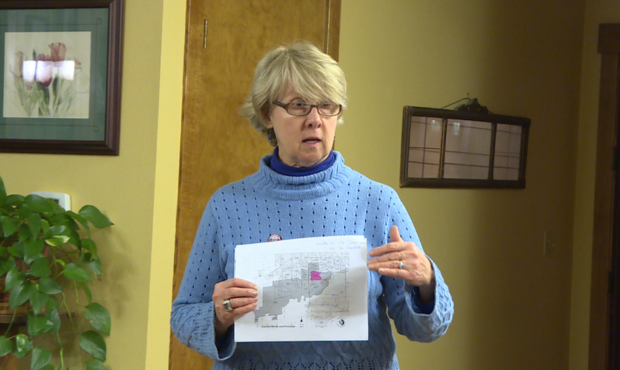Iowa Caucus 101 for Hillary Clinton precinct captains
DES MOINES, Iowa Tears welled up in Julie Stauch's eyes as she talked about the Iowa caucus.
"I love the process. It's very empowering," said the Iowa native, standing in her living room. A group of nine fellow Hillary Clinton precinct captains were gathered here, and they were eating mini-quiches, sipping wine, sharing insights and nervously laughing about using "a little common sense." They were winding down after Stauch's "Caucus 101."
Stauch had spent the evening walking them through what to expect on caucus night, detailed their responsibilities and answered an array of questions with calm, detailed answers.
"A meeting with your neighbors where you talk about the political future of our country," is the way Stauch broadly describes the caucus. But those meetings don't go off without dedicated volunteers who facilitate the process. The Democratic and Republican parties have volunteers work alongside the candidate captains at school gyms, community centers and churches.
On Republican side, the caucus process is pretty simple: caucus-goers cast their votes by writing a candidate's name on a piece of paper and putting it into a box. They must be registered Republican voters but can register on-site by bringing a photo ID and proof of residence.
On the Democratic side, it's more complicated, and some wheeling and dealing comes into play. First, attendees gather into groups based on the candidate they support. Those groups will be corralled by the precinct captain - the folks who met at Stauch's house. There are then two periods of "realignment" where people can shift their allegiances. During the second realignment, if a candidate does not meet the threshold of 15 percent of caucus-goers, their whole group must disperse to other viable candidates. That's where the cajoling comes into play.
"Approach them with a show of resect for their candidate and them because they are going to be feeling kind of sad that they are not viable," Stanch directed, reminding the group that she had some personal experience with this as a Gen. Wesley Clark supporter in 2004.
Her husband suggested talking to O'Malley's supporters about gun control -- one of Clinton's main lines of attack against her top opponent, Bernie Sanders. Staunch, however, suggested a different approach meant to play on voters' sympathies. She would explain O'Malley was her second choice and mention her respect for his political experience as mayor and governor.
Questions ran the gamut: "Timing?" "What do we do with young children?" "Is food allowed?"
The Clinton precinct captains will have a list of people who have committed to caucus in their precincts. Shelly Velman wants to know what to do if they don't show up. Rachel Niemerski, the Clinton organizer who has let Stauch lead the show until this moment, jumps in. "Call them!" she exclaims.
But sometimes, just having a little faith in the process is all the advice that the veteran caucus-goer and Clinton organizer had to give.
"What do we do if someone in my precinct is running themselves?" asked Shelly Velman, in a timid voice. Stauch asks Velman to elaborate.
"He is a candidate...like a candidate for president," Velman explains.
"Well, I think it will turn out okay," Stauch said, shifting her gaze to Niemerski who shrugs -- she doesn't have an answer for that one. It might be awkward, but it's unlikely he'll be viable.
Stauch, who was also a Clinton supporter in 2008, has been active in this campaign from early on. In September she even hosted a Clinton "Jeopardy" at her house to inform her friends about Clinton. She made her own "Jeopardy" board and questions.
The lesson ends after the fourth round of questions an hour and a half after it started.
"People come out of caucus with a whole different sense about their political power than they have when they go and vote in a booth," Stauch said. "You stand up and you are a part of something and it is very dynamic. And you are like, 'Oh my god,' this is really what it is all about."
Her hope for Monday night is simple: "I want Hillary to win. I want her to win Iowa big."
Whether Clinton wins or loses, one thing is certain -- Julie Stauch did everything she could.
